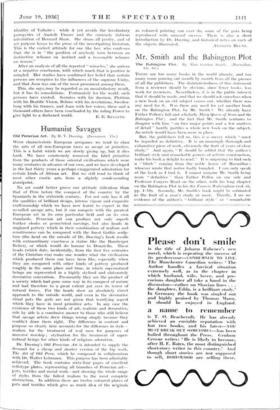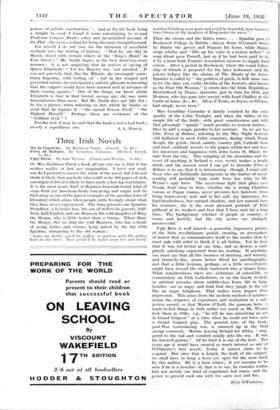Mr. Smith and the Babington Plot
THERE are too many books in the world already, and MO many come pouring out meth by month from all the presses of all the publishers. '1'lle disinterestedness of this statement from a reviewer should lie obvious, since fewer hooks, less work for reviewers. Nevertheless, it is in the public interest that it should be made, and that we should ask ourselves when a new book on an old subject comes out, whether there was any need for it. Was there any need for yet another hook on the Babington Plot, by Mr. Smith ? We already have Father Pollen's full and scholarly Mary Queen of Scots and the Babington Plot ; and the fact that Mr. Smith ventures to disagree with him " on two major points and a few matters of detail " hardly justifies a whole new hook on the subject. An article would have been more in place.
But, the publishers tell us, this is a survey which " must be regarded as definitive. It is an amazingly thorough and exhaustive piece of work, obviously the fruit of years of close study." And again, " It should be added that. the author's brilliant style and remarkable powers of artistic construction, make his book a delight 10 read." It is surprising to find such a " blurb " coming from the noble house of Macmillan : whoever wrote that notice badly bungled. 1 can only speak of the book as I find it. I cannot imagine Mr. Smith being more " definitive " than Father Pollen on one side and Professor Conyers Head on the other, N, Oh his long chapter on the Babington Plot in his Sir Francis ll'ulsinghom (vol. iii, pp. 1-70). Secondly, Mr. Smith's book might be estimated as the fruit of a year's study at st. Thirdly, I see no evidence of the author's " brilliant style " or " remarkable
powers of artistic construction " ; and as for his book being a delight to read, I found it more entertaining to re-read Professor Conyers Read's sober and unvarnished account of the Plot—the more exciting for being the more straightforward.
For myself I do not care for the intrusion of novelistic Methods into the writing of history.- " Had he, one day in -March, dined with Certain others at the King's Head' in -Fish Street ? " Mr. Smith begins in the best detective-story manner ; it is not surprising that he arrives at saying of Queen Elizabeth : " Yet her Majesty was ' not satisfied.' It was not precisely that, like the Mikado, she envisaged ` some- thing lingering, with boiling oil' ; but in her warped and perverted nature she anticipated a sadistic pleasure in knowing that the culprits would have been warned well in advance of their coming agonies." One of the things we know about Elizabeth is that in that brutal, savage age, she was more humanitarian than most. But Mr. Smith does not like her ; he has a phrase, when referring to her, which he thinks so good that he repeats it—" the sacred Person Itself," " the Highest Herself." Perhaps these are evidences of the " brilliant style " ?
For the rest, it may be said that the book is not a bad book ;











































 Previous page
Previous page